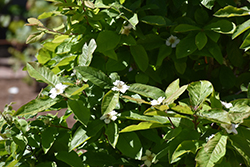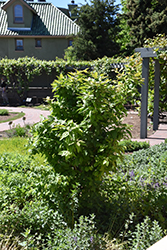It's all about ...
plants

Marron™ Medlar
Mespilus germanica 'Marron'
Height: 10 feet
Spread: 8 feet
Sunlight:
![]()
![]()
Hardiness Zone: 5a
Other Names: Common Medlar
Description:
This flowering shrub produces lovely white flowers in spring followed by fruit that ripens in mid-fall; the fruits are edible, and have the taste and texture of spiced applesauce; stake to develop a strong straight trunk to support a spreading crown
Edible Qualities
Marron™ Medlar is a small tree that is typically grown for its edible qualities, although it does have ornamental merits as well. It produces large coppery-bronze round fruit (technically 'hips') which are usually ready for picking from early to mid fall. The fruit will often fade to dark brown over time. The fruits have a spicy taste and a soft texture.
The fruit are most often used in the following ways:
- Fresh Eating
- Preserves
- Wine-Making
- Sauces
Features & Attributes
Marron™ Medlar is clothed in stunning white cup-shaped flowers at the ends of the branches in mid spring. It has green deciduous foliage. The fuzzy pointy leaves turn red in fall. The fruits are showy coppery-bronze hips which fade to dark brown over time, which are carried in abundance from mid summer to mid fall.
This is a multi-stemmed deciduous tree with an upright spreading habit of growth. Its average texture blends into the landscape, but can be balanced by one or two finer or coarser trees or shrubs for an effective composition. This plant will require occasional maintenance and upkeep, and usually looks its best without pruning, although it will tolerate pruning. It is a good choice for attracting birds, bees and butterflies to your yard. It has no significant negative characteristics.
Aside from its primary use as an edible, Marron™ Medlar is sutiable for the following landscape applications;
- Accent
- Hedges/Screening
- General Garden Use
- Orchard/Edible Landscaping
Planting & Growing
Marron™ Medlar will grow to be about 10 feet tall at maturity, with a spread of 8 feet. It has a low canopy with a typical clearance of 1 foot from the ground, and is suitable for planting under power lines. It grows at a medium rate, and under ideal conditions can be expected to live for 40 years or more. This is a self-pollinating variety, so it doesn't require a second plant nearby to set fruit.
This tree can be integrated into a landscape or flower garden by creative gardeners, but is usually grown in a designated edibles garden. It does best in full sun to partial shade. It is very adaptable to both dry and moist locations, and should do just fine under average home landscape conditions. This plant should not require much in the way of fertilizing once established, although it may appreciate a shot of general-purpose fertilizer from time to time early in the growing season. It is not particular as to soil type or pH. It is somewhat tolerant of urban pollution. This is a selected variety of a species not originally from North America.
This plant is not reliably hardy in our region, and certain restrictions may apply; contact the store for more information.

